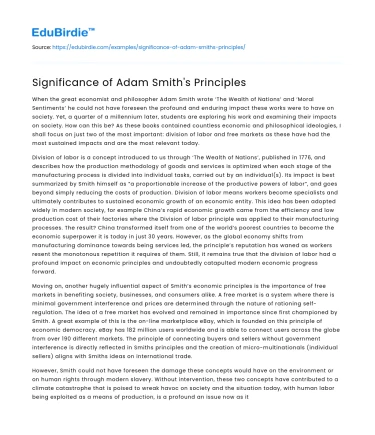When the great economist and philosopher Adam Smith wrote ‘The Wealth of Nations’ and ‘Moral Sentiments’ he could not have foreseen the profound and enduring impact these works were to have on society. Yet, a quarter of a millennium later, students are exploring his work and examining their impacts on society. How can this be? As these books contained countless economic and philosophical ideologies, I shall focus on just two of the most important: division of labor and free markets as these have had the most sustained impacts and are the most relevant today.
Division of labor is a concept introduced to us through ‘The Wealth of Nations’, published in 1776, and describes how the production methodology of goods and services is optimized when each stage of the manufacturing process is divided into individual tasks, carried out by an individual(s). Its impact is best summarized by Smith himself as “a proportionable increase of the productive powers of labor”, and goes beyond simply reducing the costs of production. Division of labor means workers become specialists and ultimately contributes to sustained economic growth of an economic entity. This idea has been adopted widely in modern society, for example China’s rapid economic growth came from the efficiency and low production cost of their factories where the Division of labor principle was applied to their manufacturing processes. The result? China transformed itself from one of the world’s poorest countries to become the economic superpower it is today in just 30 years. However, as the global economy shifts from manufacturing dominance towards being services led, the principle’s reputation has waned as workers resent the monotonous repetition it requires of them. Still, it remains true that the division of labor had a profound impact on economic principles and undoubtedly catapulted modern economic progress forward.
Save your time!
We can take care of your essay
- Proper editing and formatting
- Free revision, title page, and bibliography
- Flexible prices and money-back guarantee
Moving on, another hugely influential aspect of Smith’s economic principles is the importance of free markets in benefiting society, businesses, and consumers alike. A free market is a system where there is minimal government interference and prices are determined through the nature of rationing self-regulation. The idea of a free market has evolved and remained in importance since first championed by Smith. A great example of this is the on-line marketplace eBay, which is founded on this principle of economic democracy. eBay has 182 million users worldwide and is able to connect users across the globe from over 190 different markets. The principle of connecting buyers and sellers without government interference is directly reflected in Smiths principles and the creation of micro-multinationals (individual sellers) aligns with Smiths ideas on international trade.
However, Smith could not have foreseen the damage these concepts would have on the environment or on human rights through modern slavery. Without intervention, these two concepts have contributed to a climate catastrophe that is poised to wreak havoc on society and the situation today, with human labor being exploited as a means of production, is a profound an issue now as it was during the slave trade during the 18th-19th centuries.
Without a doubt, Smith’ principles are important as they have fueled economic growth and that society has prospered as a result with over two centuries of raised living standards and wealth across the globe. But as what cost, as these negative costs hold equal importance as the benefits?






 Stuck on your essay?
Stuck on your essay?

